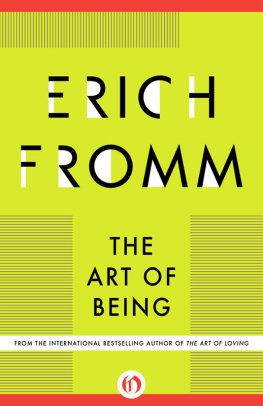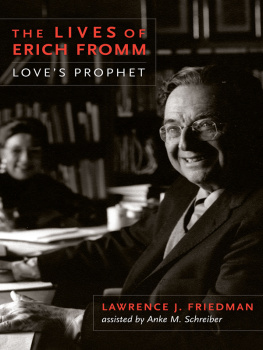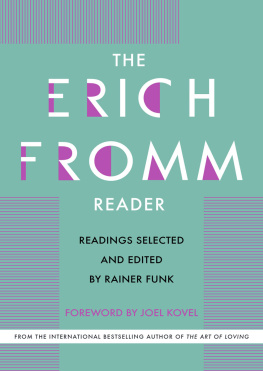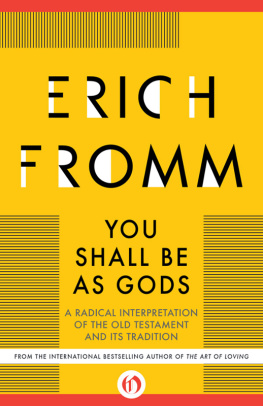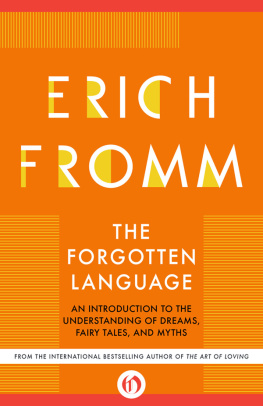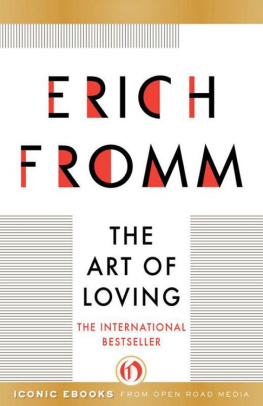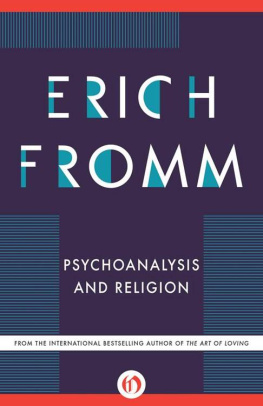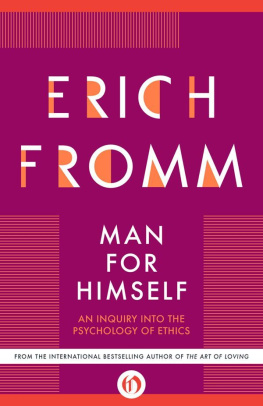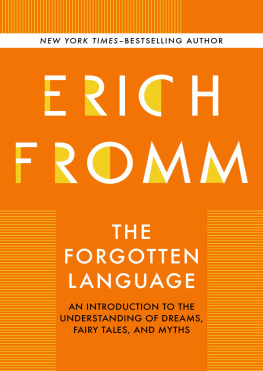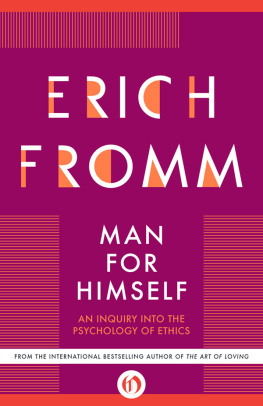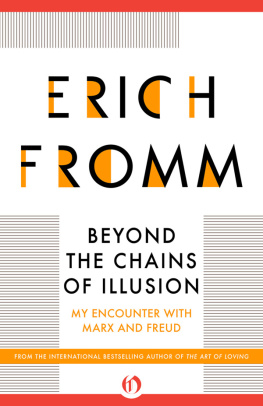
The Art of Being
Erich Fromm
Edited and with a Foreword by Rainer Funk

Editors Foreword
Between 1974 and 1976, while working on the book To Have Or to Be? at his home in Locarno, Switzerland, the aged Erich Fromm wrote far more manuscript and chapters than were actually used in the book, which was published in 1976. Some of these chapters are contained in the present volume. They deal entirely with the steps toward being that the individual can take in order to learn the art of being.
Fromm withdrew the chapters on Steps toward Being from the typescript shortly before the typesetting of To Have Or to Be? because he believed that his book could be misunderstood to mean that each individual has only to search for spiritual wellbeing in the awareness, development, and analysis of himself without changing the economic realities that produce the having mode. The roots of the mass phenomenon of orientation toward having, which are typical of a luxuriant society that has everything, were to be sought for in the economic, political, and social realities of modern industrial society, especially in its organization of labor, and in its modes of production.
Despite the fact that our orientation toward having is rooted in the structural realities of todays industrial culture, the overcoming of these realities consists in rediscovering mans own psychic, intellectual, and physical powers and in his possibilities of self-determination. For this reason, these Steps toward Being are now being published. They are intended to be a guide to productive self-awareness.
Recent trends have certainly made it clear that the awareness, realization, development, etc., of ones self almost always mean something other than the enhancement of ones own subjective powers. Today, by and large, individual narcissism is simply being strengthened and the inability to reason and to love (which, according to Fromm, are characteristics of an orientation toward being) entrenched, as techniques of self-awareness offer new crutches of orientation toward having.
The following summary of some of the statements made earlier in To Have Or to Be? is meant not to be a substitute for having read that book, but rather to remind all who have read it of its most important thoughts.
Erich Fromm understood the alternatives having or being to be two fundamental modes of existence, or two different kinds of orientation toward self and the world, two different types of character structure whose respective dominance determines the totality of how a person thinks, feels, and acts. If one investigates all the possible ways in which a person can orient his life, then one comes to this conclusion: In the end, a person orients his life either toward having or toward being.
What does it mean when someone ultimately orients his or her life toward having?
Whoever orients his or her life toward having determines oneself, ones existence, ones meaning of life, and ones way of life according to what one has, what that person can have, and what one can have more of. Now, there is almost nothing that could not become an object of having and of the desire to have: material things of all typesones own house, money, stocks, artworks, books, stamps, coins, and other things that, in part, can be amassed with the passion of a collector.
People, too, can become the object of having or of the desire to have. Of course, one does not say that one takes possession of another person and considers that person ones property. One is more considerate in this regard and prefers to say that one is concerned about others and takes responsibility for them. But it is well known that whoever has the responsibility for others also has the right to dispose of them. Thus, children, the disabled, the old, the sick, and those in need of care are taken possession of and considered to be a part of ones own selfand woe! should the sick become healthy and the child wish to decide for itself. Being determined by the having mode then becomes obvious.
As though it were not enough that other people can be had, we also determine the conduct of our lives by taking on or acquiring virtues and honors. All that matters to us is that we have esteem, a certain image, health, beauty, or youth, and when this is no longer possible, then we at least want to have experience or memories. Convictions of a political, ideological, and religious nature can also be acquired as possessions and staunchly defendedto the point of bloodshed. Everything is made dependent upon whether one is in possession of the truth or whether one is in the right.
Virtually anything can be possessed if a person orients his way of life toward having. The issue is not whether one does or does not have something, but rather whether a persons heart is set on what he or she does or does not have. Orientation toward not-having is a having orientation, too. Fromm is not advocating asceticism; orientation toward being is precisely what is not identical with orientation toward not-having. The perpetual question concerns the position that having or not-having holds in the determination of ones purpose in life and in the determination of ones own identity. It is often difficult to distinguish whether someone possesses something in the having mode of existence or, to quote Fromm, whether someone possesses as if he were not possessing. Yet each person can quickly test himself or herself by asking what he or she finds particularly valuable, thereby getting an idea of what would happen if he or she were to lose what was important and valuable: whether he or she would lose the ground from under his or her feet and whether life would then become meaningless. If one can then no longer feel any self-reliance or self-value (intrinsic to oneself), if life and work are no longer worth anything, then one is determining life according to an orientation toward having: having a fine vocation, obedient children, a good rapport, profound insights, better arguments, and so forth.
The person who is oriented toward having always makes use of crutches rather than his or her own two feet. That person uses an external object in order to exist, in order to be oneself as he or she wishes. He or she is himself or herself only insofar as that person has something. The individual determines being as a subject according to the having of an object. He or she is possessed by objects, and thus by the object of having them.
At the same time, the metaphor of crutches replacing ones own feet makes apparent what is meant by a different orientation, that of being. Just as a person has a physical capacity for self-reliance, which can be replaced with crutches if need be, so does one have psychic abilities for self-reliance, too: a capacity for love, a capacity for reason, and a capacity for productive activity. But it is also possible for a person to replace those innate psychic powers with an orientation toward having, such that a capacity for love, reason, and productive activity depends upon the possession of those objects of having upon which the heart is set.
Love, reason, and productive activity are ones own psychic forces that arise and grow only to the extent that they are practiced; they cannot be consumed, bought, or possessed like objects of having, but can only be practiced, exercised, ventured upon, performed. In contradistinction to objects of havingwhich are expended when they are used uplove, reason, and productive activity grow and increase when they are shared and used.
Next page
